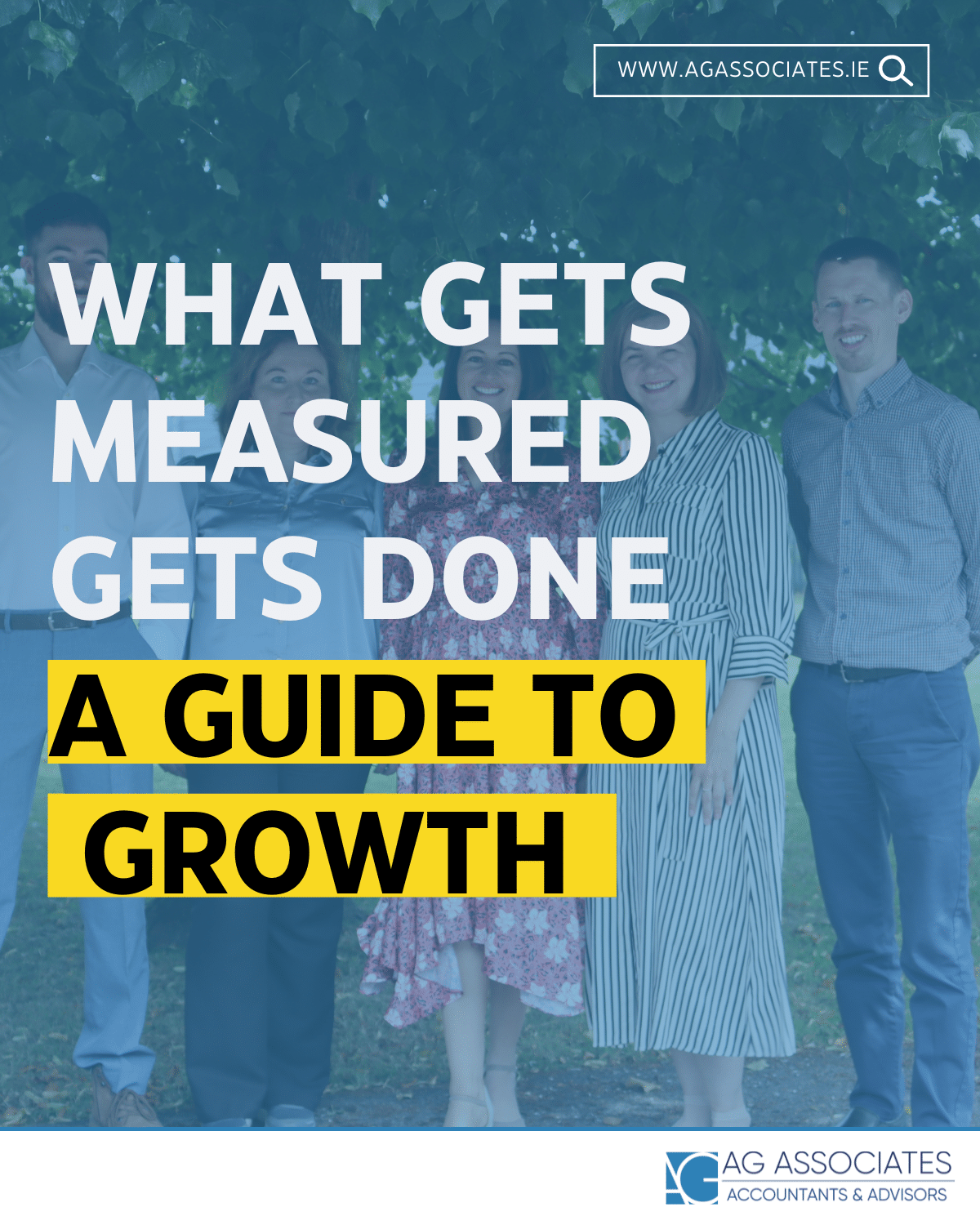What Gets Measured Gets Done – A Guide to Growth
Using Accounts
There is a quote that springs to mind when I talk about measurement. It’s “what gets
measured gets done.”
It’s a five word story really. You focus on the thing that is measurable. The same can be
said for a business. How do you know if you’re doing well? You look at your sales, your
staffing levels, your growth in the market. You analyse your performance.
Performance can only be managed when you start measuring, when you decide what it is
you want to measure.
This is where KPIs or Key Performance Indicators are essential to knowing where you
stand on a daily, weekly and monthly basis. Having control over your accounts, your KPIs,
gives you power to make informed decisions, to make changes, to change direction, to
take advantage of opportunities and to grow your business.
What gets measured gets done because it focuses you and your business on
performance. Comparing performance yearly, quarterly and month by month allows you to
identify patterns – whether good or bad – so you can make the right decisions for your
business.
In terms of what gets measured, well, every business and industry sector is different.
However a common set of rules apply.
Rule No. 1 – Decide KPIs with your entire business in mind
Create your financial KPIs with other business KPIs. It’s important to create the right KPIs
for your entire business. You won’t be able to triple revenues in three years time if you’ve
got a sales growth target of 10% this coming year and a staff of one. Your accountant will
be able to help you with this.
You should always pick a maximum of 6 KPI’s, at any time, no more than this as there will
be too many. Examples of key performance indicators are:
Gross Profit by product
Profit and Loss Account
Key Financial Ratios
Current Ratio Acid Test Ratio
Gearing Assets
Sales Debtor Days
Creditor Days
Net Profit %
Return on capital %
Return on assets %
Operating Profit
Your accounting systems should monitor more than just your monthly finances, your KPIs
can be monitored as well. For example, the number of customer complaints, orders
delivered on time, conversion of sales leads to customers, quality control rejections and
staff productivity etc.
Rule No. 2 – Group your KPIs into categories
This makes things easier to create the KPIs, monitor them and measure them. It’s like
starting with a blank piece of paper and being told to write. It’s so difficult knowing what to
write or take that first step.
Here at AG Associates, we suggest categories for our clients and we create a list of KPIs
to measure.
Take the list from the rule number 1 above. Categorise them into growth, productivity and
cashflow.
Let’s use breakeven analysis as a KPI category. At what level of sales do you breakeven?
How does this work out on a weekly, monthly and annual basis? What level of profit do you
need to cover costs? What level of profit is needed to reach target profits?
For a business selling products, the breakeven point is calculated by dividing the
company’s total overheads by their gross profit margin. The gross profit margin is gross
profit over total revenue.
Rule No. 3 – Always know how to answer the ‘What If’ Question
The beauty of financial KPIs is that you can make informed decisions based on your
numbers. Knowing your financial situation, be it cashflow or cost of goods sold is so, so
important. In today’s fast paced world, you really need to have a real-time view on your
KPIs.
You can monitor your performance against key performance indicators, agreed with your
accountant. You can analyse sales growth, gross margin, net profit, how long it takes to
get money in and how much credit you’re giving your debtors.
Once you know all the above, you are in a powerful position to be able to ask the what if
questions about the business. You can now measure the impact on your key performance
indicators, breakeven point and financial projections.
If you’d like to discuss anything in this article, please get in touch.
AG Associates is an accounting practice that specialises in accounting and payroll
solutions for the SME business owner to provide an instant snap shot of how a business is
doing right now.
For further information please contact Angela at Unit 11, Eastgate Way, Little Island,
Cork. 021 4824723 or info@agassociates.ie

